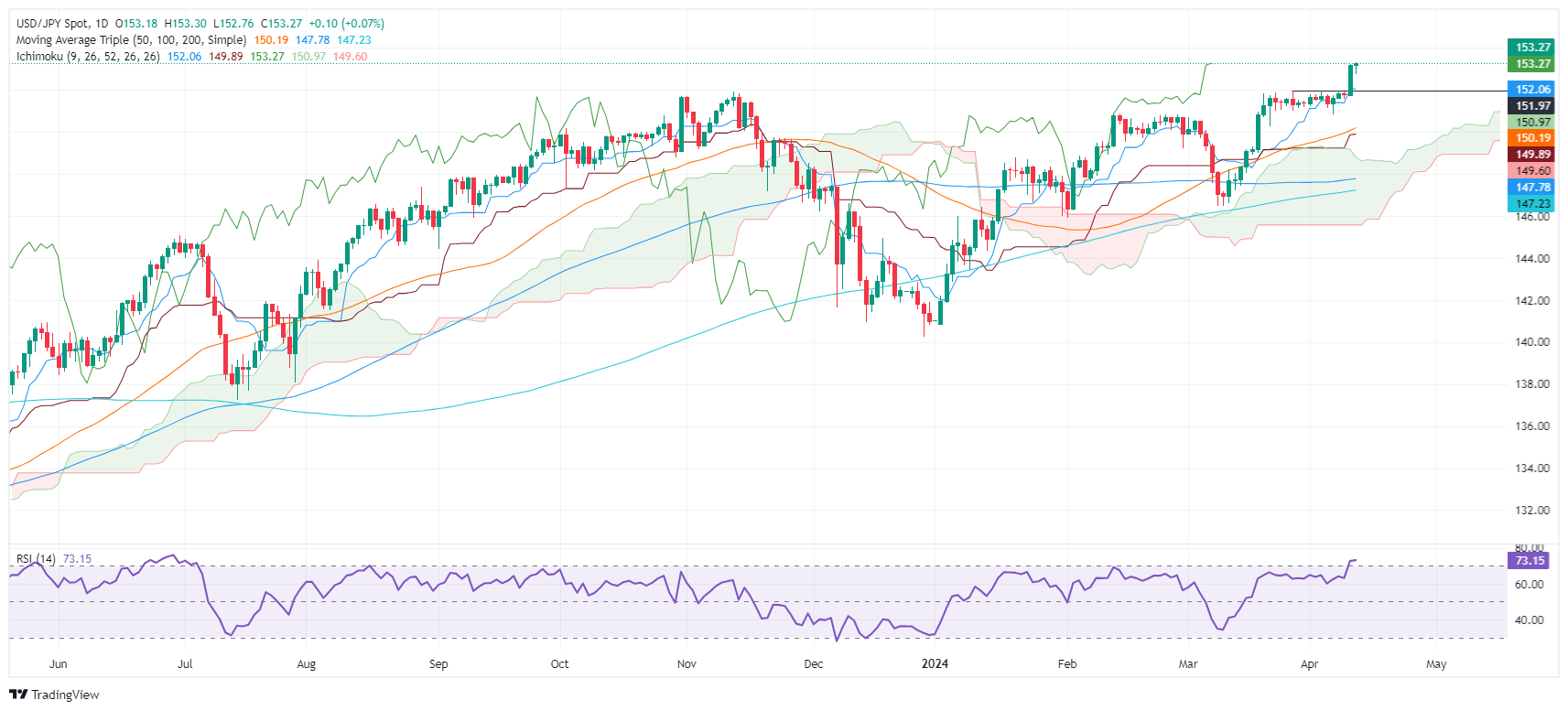- Analytics
- News and Tools
- Market News
- USD/JPY refreshes 34-year highs above 153.00 following US PPI data
USD/JPY refreshes 34-year highs above 153.00 following US PPI data
- USD/JPY edges up to 153.22, lifted by inflation reports and rising DXY.
- US PPI data indicates slower inflation growth yet fails to dampen the bullish momentum for the US Dollar.
- Fed officials express disappointment in inflation trends, highlighting ongoing economic challenges.
The USD/JPY climbed during the North American session and remains above the 153.00 figure despite Japanese authorities jawboning on excessive Japanese Yen (JPY) movements. Further data from the United States (US) depicts inflation is stickier than expected, putting pressure on the Federal Reserve. At the time of writing, the major trade at 153.22, up 0.05%.
Despite Japanese interventions warnings, USD/JPY edges higher as stickier US inflation data fuels USD strength
The Greenback is strengthening across the board, as the US Dollar Index (DXY) rises to its highest level since November 2023. The DXY is up at 105.51, shy of testing the next resistance seen at 106.06. Wednesday’s inflation report sponsored the buck’s reaction. Meanwhile, the recently revealed Producer Price Index (PPI) was softer compared to CPI, though it failed to weigh on the US Dollar.
The US Department of Labor revealed that PPI in March slowed more than expected, coming at 0.2% MoM, below estimates of 0.3%. Annually-based figures witnessed the PPI rising by 2.1%, lower than projected by surpassing February’s 1.6%, while the core PPI stood at 2.4%, also above estimates and the previous month's data.
Given that US economic data suggests that the Federal Reserve’s job is not done, further US Dollar strength is seen, in the near term. Also, US Treasury yields on Wednesday, climbed more than 20 basis points along the whole yield curve, boosting the prospects of the American currency.
In the meantime, Federal Reserve officials continued to cross the wires. New York Fed President John Williams commented that recent inflation data has been disappointing, adding that the economic outlook is uncertain. Recently, Richmond’s Fed Thomas Barkin added that the latest inflation data does not increase confidence that disinflation is spreading in the economy, raising the question of whether we (the Fed) are seeing a shift.
On the Japanese front, Finance Minister Suzuki said that authorities wouldn’t rule out any steps to deal with excessive volatility in the Yen. He added, “We are looking with a high sense of urgency.”
USD/JPY Price Analysis: Technical outlook
Given the fact the USD/JPY has broken the 153.00 barrier, the next resistance level would be the June 1990 monthly high at 155.78, followed by the April 1990 pivot high at 160.32. On the other hand, the risks of intervention could tumble the pair toward the next key support levels. Firstly, the Tenkan-Sen at 152.05, followed by the Senkou Span A at 150.97, the Kijun-Sen at 149.89, closely followed by the Senkou Span B at 149.59.
© 2000-2026. All rights reserved.
This site is managed by Teletrade D.J. LLC 2351 LLC 2022 (Euro House, Richmond Hill Road, Kingstown, VC0100, St. Vincent and the Grenadines).
The information on this website is for informational purposes only and does not constitute any investment advice.
The company does not serve or provide services to customers who are residents of the US, Canada, Iran, The Democratic People's Republic of Korea, Yemen and FATF blacklisted countries.
Making transactions on financial markets with marginal financial instruments opens up wide possibilities and allows investors who are willing to take risks to earn high profits, carrying a potentially high risk of losses at the same time. Therefore you should responsibly approach the issue of choosing the appropriate investment strategy, taking the available resources into account, before starting trading.
Use of the information: full or partial use of materials from this website must always be referenced to TeleTrade as the source of information. Use of the materials on the Internet must be accompanied by a hyperlink to teletrade.org. Automatic import of materials and information from this website is prohibited.
Please contact our PR department if you have any questions or need assistance at pr@teletrade.global.
















